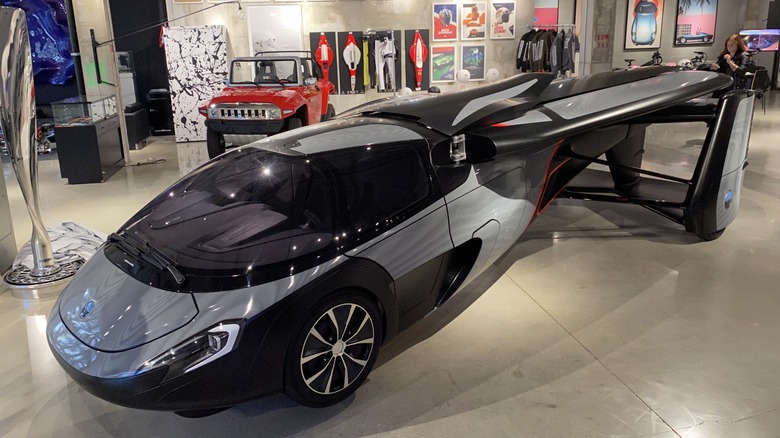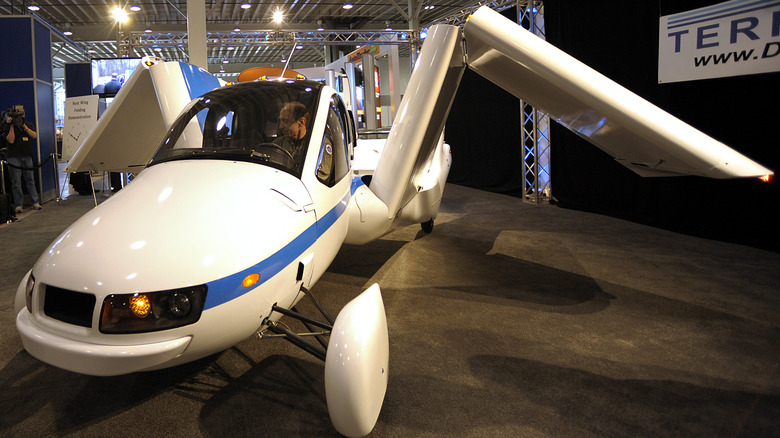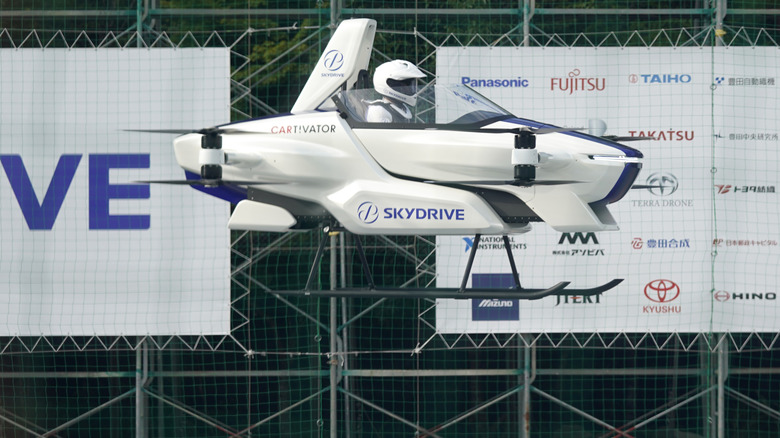Are Flying Cars Coming Sooner Than We Expected?
When movie scriptwriters in the 1970s and 1980s were thinking about what the future would look like, flying cars were often in the picture. We're now in 2022 and we haven't yet seen flying cars made available at the local dealership. However, that doesn't mean flying cars don't exist. According to Tracxn, at least 36 startups in the U.S. are already working to make flying cars a reality.
Beyond that, a flying car in Slovakia was recently cleared for takeoff, and the company behind it is planning to launch it commercially within the next 12 months (via CNN). Not to forget, Uber has partnered with Joby Aviation and invested $75 million to build a fleet of electric flying taxi vehicles to evade traffic congestion. With these announcements, one has to wonder if flying cars are no longer the pipe dream they once were. Are we closer to flying cars than we previously expected?
Flying cars are yet to be approved by NHTSA and FAA
For an automobile to be considered a flying car, it must meet all the safety requirements of a car and an aircraft –- this means that it must be approved by the Federal Aviation Administration (FAA) and National Highway Traffic Safety Administration (NHTSA). Suffice to say, this process could be complex and time-consuming. For instance, the Terrafugia Transition was granted its airworthiness certificate in 2021 by the FAA –- this happened 12 years after it made its maiden flight (via AOPA).
The NHTSA requires all cars on public roads to meet the Federal Motor Vehicle Safety Standards. The problem is if you're making a flying car and you include everything required by NHTSA, your car could have too much air drag that could slow it down and pose a flight risk. Not to mention, it could be expensive for the flying car manufacturer. Because of that, Terrafugia Transition sought an exemption for tire selection, advanced airbags, electronic stability control systems, and traditional laminated safety glass [PDF]. The NHTSA approved the exemptions in 2011, but they were temporary ones that only lasted for three years. After the exemptions expired, the Terrafugia Transition is yet to be granted another extension or full approval from NHTSA.
Similarly, AeroMobil (the Slovakian company building flying cars) worked on a prototype for over 30 years before it was certified by the European Aviation Safety Agency (EASA). Despite its approval in Europe, AeroMobil is yet to be certified by the FAA and NHTSA (via Aviation Today).
eVTOLs are more convenient
A new design of flying vehicles could bypass the regulations of the NHTSA and only require approval from the FAA. They also don't require a runway to take off or land. This is because they use rotors to take off and land from just about anywhere. Technically, they're not called "flying cars," but rather, they're known as electric vertical take-off and landing aircraft (eVTOL). Since they rely on electric motors, they're quiet with zero carbon emission.
At the moment, Japanese company Suzuki is scheduled to launch its flying taxis in 2023 and Uber is not too far behind. Other key players such as Volocopter are planning to ferry passengers in commercial air taxis by 2024 (via Tech Wire), while Vertical Aerospace Group is expected to deliver about 1,000 eVTOLS to Virgin Atlantic, American Airlines, and Avolon Holdings the same year.
If everything goes according to plan, eVTOLs will be self-driving in the near future — just ask Sebastian Thrun, who was one of the pioneers of autonomous vehicles.
The FAA has revised pilot certifications for flying cars
If you want to ride a flying car, you might need more than a traditional helicopter or airplane pilot's license. As reported by Flying, the FAA is modifying its pilot training regulations for eVTOLs. The objective is to create a special class framework to certify pilots for eVTOLs under the "powered-lift aircraft" category –- this is a shift in regulations since eVTOLS were previously categorized as "light aircraft".
It's not clear how FAA's new regulations will change the flying car industry in the future, but it has been criticized by the General Aviation Manufacturer's Association (GAMA). Speaking to Reuters, GAMA CEO and President Pete Bunce said that these new regulations would be "detrimental to safety" and would increase the FAA's workload "dramatically," adding that it's a "bad policy for so many reasons."
There is also the question of infrastructure for flying cars. According to McKinsey, most cities will first need to build expensive infrastructure for flying cars and eVTOLs, including space for take-offs and landings. When will it happen? We don't know for sure. However, we know a few flying cars have successfully been tested and they could be available to the public as early as 2023.



